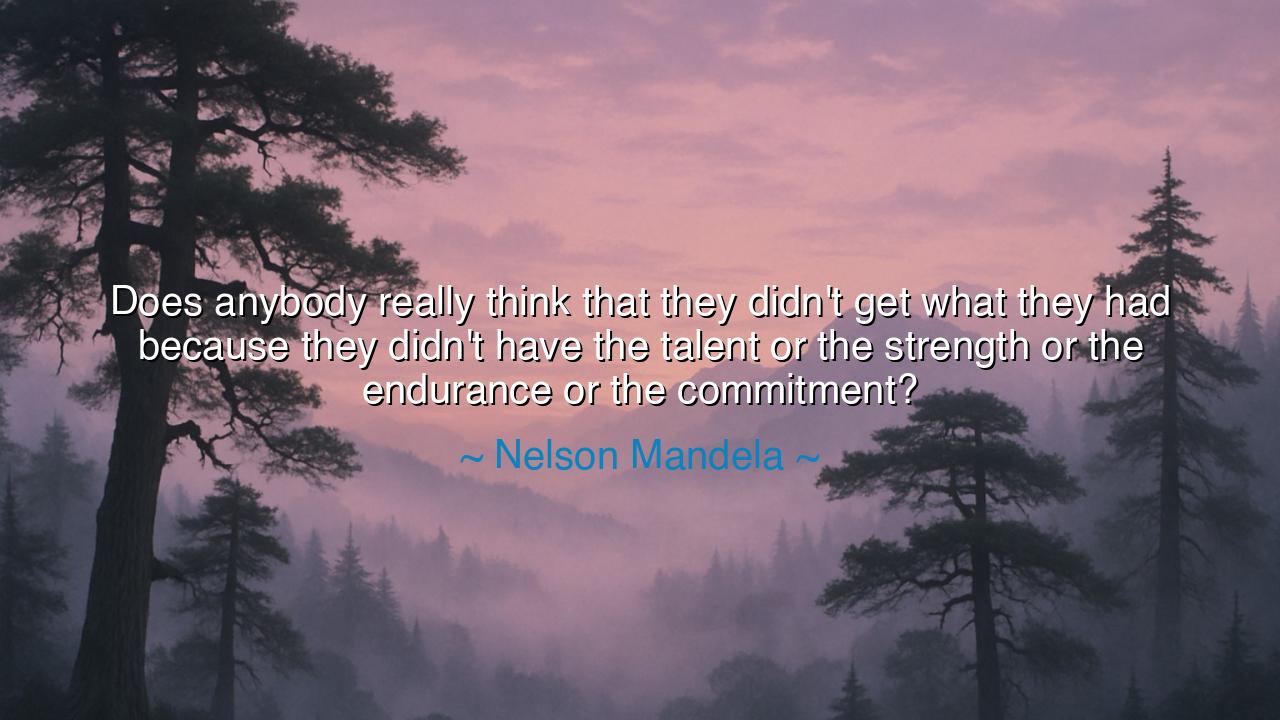
Does anybody really think that they didn't get what they had
Does anybody really think that they didn't get what they had because they didn't have the talent or the strength or the endurance or the commitment?






Nelson Mandela, the lion of South Africa, spoke with the weight of lived suffering and triumph when he asked: “Does anybody really think that they didn't get what they had because they didn't have the talent or the strength or the endurance or the commitment?” In these words lies both a challenge and a revelation. He points not to the failings of individuals but to the invisible walls of injustice that deny men and women their rightful place, regardless of their gifts. For many who are oppressed, it is not the absence of ability that binds them, but the chains of circumstance, of prejudice, of power wielded unjustly.
The ancients, too, spoke of this. In the tragedies of Aeschylus and Sophocles, noble men and women often fell, not because they lacked courage or wisdom, but because fate—or unjust rulers—pressed them down. Talent, endurance, and commitment are mighty, yet even these are sometimes not enough when the world conspires to bury them. Mandela’s words shine a light on this eternal truth: ability alone is not the sole architect of destiny; freedom and fairness are its companions.
Mandela’s own life illustrates his meaning. He possessed talent as a lawyer, strength as a leader, endurance that withstood twenty-seven years in prison, and commitment to justice unshaken by decades of hardship. Yet for much of his life, he was denied the fruits of these virtues, held captive by an unjust system of apartheid. His story was not one of lack, but of oppression. And when the chains finally fell, his gifts, long suppressed, blossomed into leadership that reshaped a nation. Thus, his question is not rhetorical—it is a testimony: countless souls have gifts equal to kings and prophets, yet are silenced by circumstance.
History gives us other examples. Consider Frederick Douglass, born into slavery. Did he lack intelligence, endurance, or commitment? No—he possessed a towering mind and an indomitable spirit. But it was the weight of bondage that denied him opportunity. When freedom finally came, his gifts exploded forth, and he became one of the greatest voices for liberty the world has ever known. Mandela’s words echo across such lives: it is not weakness of character that denies men their due, but the injustices that bind them.
Yet these words are not only an indictment—they are also a call to endurance. For Mandela does not dismiss talent, strength, or commitment; he honors them as noble virtues. He teaches that when opportunity is absent, one must not despair, but continue to cultivate these gifts, preparing for the day when freedom opens its doors. To believe failure is the result of personal inadequacy alone is folly; to recognize that strength can be hidden, waiting for its hour, is wisdom.
The lesson, then, is twofold. First, do not look upon the broken or oppressed and assume they lack ability. Within them may be greatness waiting to be revealed. Second, if you yourself are denied your due, do not fall into despair. Your talent, your strength, your endurance, and your commitment are not wasted. They are seeds in the soil of time, awaiting their season of growth. The world may delay you, but it cannot erase you.
Practical action flows from this teaching: cultivate your gifts tirelessly, even when recognition seems far away. Refuse to believe the lie that your worth is measured by present success. And for those who hold positions of influence, strive to remove the barriers that prevent others from rising. Encourage talent wherever it is found, and open doors for those long denied. In this way, you honor Mandela’s wisdom: that greatness is not rare, but often hidden beneath the weight of injustice—and when freed, it can transform the world.






AAdministratorAdministrator
Welcome, honored guests. Please leave a comment, we will respond soon